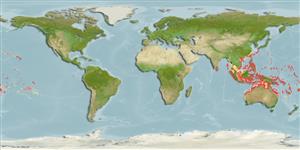>
Acanthuriformes (Surgeonfishes) >
Siganidae (Rabbitfishes)
Etymology: Siganus: Latin, siganus = a fish, rabbit fish; by the similarity of the nose (Ref. 45335).
More on author: Linnaeus.
Environment: milieu / climate zone / depth range / distribution range
Ecologia
marinhas associadas(os) a recifes; intervalo de profundidade 1 - 50 m (Ref. 28016), usually 1 - 20 m (Ref. 27115). Tropical; 24°C - 28°C (Ref. 27115); 30°N - 30°S, 77°E - 129°W
Indo-West Pacific: Known from India to French Polynesia; north to Japan; south to New Caledonia.
Tamanho / Peso / Idade
Maturity: Lm ? range ? - ? cm
Max length : 28.0 cm TL macho/indeterminado; (Ref. 9710); common length : 18.0 cm TL macho/indeterminado; (Ref. 9813)
Espinhos dorsais (total) : 13; Raios dorsais (total) : 10; Espinhos anais: 7; Raios anais : 9; Vértebras: 13. The species can adopt a number of camouflage patterns involving off-white, pale gray to blackish, and various shades of brown. The basic pattern consists of a labyrinth of narrow bands with upper half vermiculate, the lower ones tend to meander horizontally. This pattern extends to the fins. Iris golden dissected by a chocolate cross. 4-5 irregular off-white bars on caudal peduncle. Scales fine on cheeks, densely packed over lower 2/3 of preopercular region. Midline of thorax without scales between pelvic ridges. Fin spines stout, pungent, venomous. Preopercular angle 87-100 degrees.
Adults inhabit shallow coral reef flats. Found in rivers (Ref. 12792, 48637). Occurs in small schools (usually less than 10 individuals). Juveniles gather in larger numbers in corals with algae-grown at their bases (Ref. 48637). Initially, they browse on fine textured, e.g. filamentous algae, switching to coarser algae with increasing size. Both adults and juveniles are diurnal feeders (Ref. 4666). Fry are marketed fresh, pickled in brine or made into fish paste (Ref. 9813). Can inflict painful stings (Ref. 4690).
Ciclo de vida ou comportamento de acasalamento
Maturidade | Reprodução | Desova | Ovos | Fecundidade | Larvas
Woodland, D.J., 1990. Revision of the fish family Siganidae with descriptions of two new species and comments on distribution and biology. Indo-Pac. Fish. (19):136 p. (Ref. 1419)
Status na Lista Vermelha da UICN (Ref. 130435: Version 2024-2)
Uso pelos humanos
Pescarias: pouco comercial; Aquário: Espécies comerciais
Ferramentas
Relatórios especiais
Baixar XML
Fontes da internet
Estimates based on models
Preferred temperature (Ref.
123201): 24.6 - 29, mean 28 °C (based on 950 cells).
Índice de diversidade filogenética (Ref.
82804): PD
50 = 0.5000 [Uniqueness, from 0.5 = low to 2.0 = high].
Bayesian length-weight: a=0.01905 (0.01276 - 0.02845), b=3.02 (2.90 - 3.14), in cm total length, based on LWR estimates for this species & Genus-body shape (Ref.
93245).
Nível Trófico (Ref.
69278): 2.0 ±0.03 se; based on food items.
Generation time: 0.5 ( na - na) years. Estimated as median ln(3)/K based on 1
growth studies.
Resiliência (Ref.
120179): Elevada, tempo mínimo de duplicação da população menor que 15 meses (Preliminary K or Fecundity.).
Prior r = 1.20, 95% CL = 0.79 - 1.80, Based on 1 data-limited stock assessment.
Fishing Vulnerability (Ref.
59153): Low vulnerability (14 of 100).
Nutrients (Ref.
124155): Calcium = 64 [32, 208] mg/100g; Iron = 1.26 [0.58, 2.88] mg/100g; Protein = 19 [17, 21] %; Omega3 = 0.139 [0.060, 0.322] g/100g; Selenium = 43.8 [15.1, 113.6] μg/100g; VitaminA = 16.7 [3.8, 80.7] μg/100g; Zinc = 2.22 [0.81, 4.57] mg/100g (wet weight);
